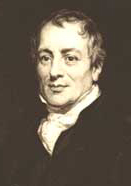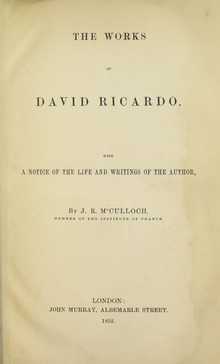David Ricardo
David Ricardo (born April 18, 1772 in London , † September 11, 1823 in Gatcombe Park ) was a British economist and a leading exponent of classical economics .
Life
David Ricardo was born on April 18, 1772, the third of 17 children into a Sephardic Jewish family. She originally came from Portugal and had only recently immigrated to London from the Netherlands . Ricardo's father worked as a stockbroker and was considered one of the richest men of his time. He introduced his son to his profession at the age of 14, took him to the London Stock Exchange and made him work there. A few years later, at the age of 21, Ricardo met Priscilla Anne Wilkinson, who was a Quaker . He married her a short time later and renounced the Jewish Orthodox faith. Ricardo's father disinherited his son and broke off all contacts. Ricardo received a loan from friends and soon opened his own brokerage office. His success made him rich just a few years later, which soon allowed him to retire from business life. Intellectually, Ricardo was influenced by Jeremy Bentham , among others , who is considered the founder of classical utilitarianism .
In addition to his business, Ricardo dealt with mathematics and science . After reading the work The Wealth of Nations by Adam Smith (1723-1790) he dealt intensively with the economy from 1799 . At first he only made studies; In 1809 he published critical newspaper articles for the first time. However, he was only concerned with his studies from 1814 onwards. In the years that followed, Ricardo was in close contact with other leading economists of his time, such as James Mill (1773–1836) and Thomas Robert Malthus (1766–1834), with whom he was friends, even if they had different professional views. In part as a result of these dialogues, especially with Mill, Ricardo's main works, Essay on the Influence of a low Price of Corn on the Profits of Stock (1815) and On the Principles of Political Economy and Taxation (1817), emerged. From 1819 Ricardo represented the Irish district of Portarlington in the British House of Commons . There he campaigned for free trade and the abolition of grain tariffs . Finally, Ricardo died on September 11, 1823 in Gatcombe Park of complications from an otitis media .
According to his contemporaries, Ricardo was “a friendly, never opinionated, considered and somewhat reserved person”.
David Ricardo was the father of eight children, including three sons. His sons Oswald Ricardo (MP for Worcester ) and David Ricardo the Younger (MP for Stroud ) became members of parliament. The third, Mortimer Ricardo, served as an officer in the Life Guards and was Deputy Lieutenant for Oxfordshire.
theory
David Ricardo published Principles of Political Economy and Taxation in 1817 . He developed the theory of comparative cost advantages , a core part of foreign trade theory , and thus established the Ricardian foreign trade model . According to Ricardo, foreign trade is worthwhile for all economies, even for those that have cost disadvantages for all goods compared to other countries . Because every country achieves the greatest possible profit from goods if it manufactures the products with the lower labor costs itself and purchases the other goods in exchange, whereby the relative cost advantages alone guarantee the international division of labor and their further specialization. The basis of his foreign trade model ( Ricardo model ) was the immobility of capital, which means that e.g. B. The basic and mineral resources of one country cannot be acquired by another country. Ricardo said that only 25 people in England were able to understand his Principles of Political Economy and Taxation at all. But the first edition of 750 copies was soon sold out, the second appeared in 1819, and the heavily revised third in 1821.
Ricardo's other important writings are the essay on the influence of a low grain price on capital profit (1815), in which he recommended the free import of grain, and the 1820 essay on the Funding System , in which he called for tax increases instead of loans. Together with Robert Torrens, Ricardo was able to prevail with the thesis that the base money must be limited. The opposite thesis of John Fullarton and Thomas Tookes , according to which an economy's need for money would regulate itself all by itself, was thus disproved.
Ricardo's name is closely linked to the theory of the basic rent . The emergence of the rent is attributed to the fact that, of the various existing soil qualities, the better ones are insufficient to meet the demand, and therefore the price of the soil products must be so high that the costs of building the worst still indispensable piece of land are just covered.
Although Ricardo otherwise accepts Say's theorem as valid in his economic analysis , in his last chapter on mechanical engineering he conceded that technical progress can lead to a reduction in employment; this attitude (although inconsistent in overall theory) was valued by Marx as "scientifically objective". With his own version of the labor theory of value , Marx tied in with Ricardo's work as the latest state of science known to him.
Terms and method
Ricardo's "grain model" is considered an early example of a one-good parabola .
The so-called Ricardian equivalence is named after Ricardo .
With the term Ricardian Vice (Eng. "A typical Ricardo mistake") Joseph A. Schumpeter sharply criticized Ricardo's method: Ricardo often makes unrealistic assumptions . In addition, he treats variables as constants which, according to the economic argument, should not be constants. Heinz D. Kurz, on the other hand, rejects Schumpeter's criticism as unjustified, since it misinterprets Ricardo's method.
The term “ Neoricardian School ” is used to describe economists such as Joan Robinson or Piero Sraffa , who have taken up Ricardo's theory and developed it into an alternative to neoclassical theory. Sraffa has also emerged as the editor of the new edition of Ricardo's collected works. Ricardo wrote an essay shortly before his death: "Absolute value and exchange value". The article only became known shortly before the publication of the Collected Works and on the occasion of a major revision of the almost complete Ricardo Complete Edition.
In honor of Ricardo, the chair of political economy at London University later bore his name.
Publications
- The High Price of Bullion, a Proof of the Depreciation of Bank Notes , London 1810
- Observations on some Passages in an Article in the Edinburgh Review, on the Depreciation of the Paper Currency , (1811)
- Reply to Mr Bosanquet's Practical Observation on the Report of the Bullion Committee (1811)
- An Essay on the Influence of a low Price of Corn on the Profits of Stock (1815)
- Proposals for an Economical and Secure Currency (1816)
- On the Principles of Political Economy and Taxation (1817)
- On Protection in Agriculture , London 1822
- Speech on Mr Western's Motion, for a Committee to consider the Effects produced by the Resumption of Cash payments (1822)
Posthumous editions:
- Plan for the Establishment of a National Bank (1824)
- The Works of David Ricardo (1826)
- The Works and Correspondence of David Ricardo (11 vols., 1951–1973)
- On the Principles of Political Economy and Taxation. Reprint of the 1817 edition, with an introduction by Frederick William Kolthammer (Friedrich Wilhelm Kolthammer). Empiricus Books, London, 3rd edition 2002, ISBN 1-902835-15-8 .
Fonts in German translation:
- The principles of political economy or economics and taxation . Translated by Christian August Schmidt. Verlag des priv. Landes-Industrie-Comptoirs, Weimar 1821 ( digitized version of the University and State Library Düsseldorf )
- On the principles of political economy and taxation. Complete German version of the English standard edition including the introduction and editorial comments by Piero Sraffa . Metropolis, Marburg 2006, ISBN 3-89518-540-X .
literature
- Edwin Cannan: Ricardo in Parliament , in: Economic Journal , Vol. 4 (1894), E-Text
- John P. Henderson: The life and economics of David Ricardo , Kluwer Publ., Boston 1997. ISBN 0-7923-9937-4 .
- Jan Hoff: Critique of Classical Political Economy. On the reception of the value-theoretical approaches of economic classics by Karl Marx. PapyRossa, Cologne 2004. ISBN 3-89438-314-3 .
- Jacob H. Hollander: The Development of Ricardo's Theory of Value , in: Quarterly Journal of Economics , Vol. 18 (1904), pp. 455-491 E-Text
- Samuel Hollander: The economics of David Ricardo , University of Toronto Press, Toronto 1979. ISBN 0-8020-5438-2 .
- Moses Ricardo / Horst Claus Recktenwald : David Ricardo. Personality and way of life , Verlag Wirtschaft und Finanz, Düsseldorf 1988. ISBN 3-87881-027-X .
- Mark Blaug: Entrepreneurship before and after Schumpeter, in Richard Swedberg Entrepreneurship. The Social Science View. Oxford University Press. New York: 2000.
- Gerhard Stapelfeldt: Liberalism. The social theories of Smith, Ricardo and Marx. Ca Ira, Freiburg i.Br. 2006, ISBN 3-924627-78-9 .
Web links
- Literature by and about David Ricardo in the catalog of the German National Library
- Works by and about David Ricardo in the German Digital Library
- David Ricardo in the catalog of the ZBW - Leibniz Information Center for Economics (ZBW)
- Josef Bordat: David Ricardo - An initial orientation to life and work (as of February 19, 2013)
- Rudolf Hammerschmidt / Katharina Kort: Worthwhile exchange - David Ricardo: "On the principles of political economy and taxation" , in: Die Zeit Online (as of September 25, 2008)
- David Ricardo , in VWLer.de (as of September 25, 2008)
- Gerhard Stapelfeldt : The Political Economy of David Ricardo (22 pages; PDF; 194 kB), from: Der Liberalismus. The social theories of Smith, Ricardo and Marx , ça ira, Freiburg 2006
Individual evidence
- ↑ a b Michael Hüther (Ed.): Classics of the Economy - From Adam Smith to Amartya Sen , Bonn 2006, p. 62f
- ↑ a b c Josef Bordat: David Ricardo - Initial observations on life and work
- ↑ a b Vera Linß: The most important economic thinkers , Wiesbaden 2007, p. 35
- ↑ David Ricardo | British economist . In: Encyclopedia Britannica . ( britannica.com [accessed May 30, 2017]).
- ↑ Vera Linß: The most important economic thinkers , Wiesbaden 2007, p. 38f
- ↑ " RICARDO, David (1772-1823), of Gatcombe Park, Minchinhampton, Glos. And 56 Upper Brook Street, Grosvenor Square, Mdx. ". History of Parliament Online.
- ↑ Heinz D. Kurz: Nothing is more practical than good theory. David Ricardo wrote his famous "Principles of Political Economy and Taxation" 200 years ago. In: Frankfurter Allgemeine Zeitung of January 13, 2017, p. 18.
- ↑ Michio Morishima: Ricardo's Economics. A general equilibrium theory of distribution and growth. Cambridge University Press 1989. ISBN 0-521-36630-5 . P. 11.
- ^ Joseph A. Schumpeter: History of Economic Analysis . Ed. Elizabeth Boody Schumpeter. London. Allen and Unwin, 1954. (German: Joseph A. Schumpeter, (Elizabeth B. Schumpeter, ed.): History of economic analysis. Two volumes. Vandenhoeck & Ruprecht Göttingen 1965.)
- ^ Heinz D. Kurz: Ricardian Vice. ( Page no longer available , search in web archives ) Info: The link was automatically marked as defective. Please check the link according to the instructions and then remove this notice. International Encyclopedia of the Social Sciences, 2nd ed.
- ↑ David Ricardo: Absolute Value and Exchange Value. In: Bertram Schefold, (Ed.): Economic Classics in Change. Theoretical essays by David Ricardo, Alfred Marshall, Vladimir K. Dmitriev and Piero Sraffa. Suhrkamp pocket book science 627. Frankfurt / Main 1986. ISBN 3-518-28227-1 . Pp. 7-14.
| personal data | |
|---|---|
| SURNAME | Ricardo, David |
| BRIEF DESCRIPTION | British economist |
| DATE OF BIRTH | April 18, 1772 |
| PLACE OF BIRTH | London , UK |
| DATE OF DEATH | September 11, 1823 |
| Place of death | London , UK |

